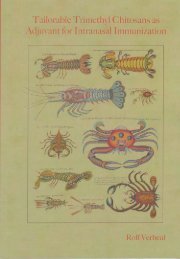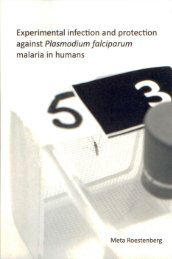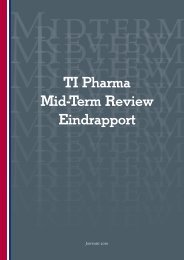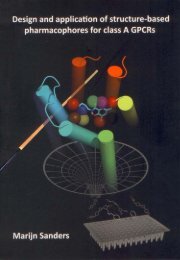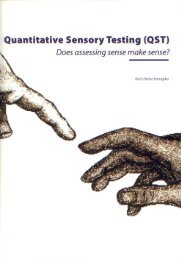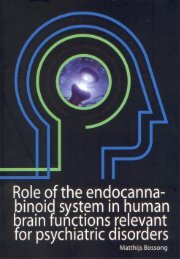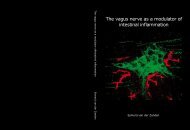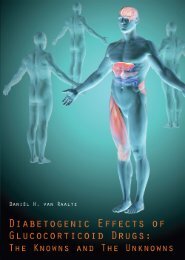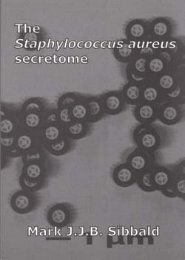towards improved death receptor targeted therapy for ... - TI Pharma
towards improved death receptor targeted therapy for ... - TI Pharma
towards improved death receptor targeted therapy for ... - TI Pharma
You also want an ePaper? Increase the reach of your titles
YUMPU automatically turns print PDFs into web optimized ePapers that Google loves.
FACTS<br />
Non‐canonical TRAIL signaling<br />
• Tumor necrosis factor‐related apoptosis‐inducing ligand (TRAIL) <strong>receptor</strong>s are attractive<br />
targets <strong>for</strong> anticancer <strong>therapy</strong> due to their selective ability to mediate caspase‐<br />
dependent apoptosis in tumor cells upon ligand binding without harming healthy<br />
tissues.<br />
• Different TRAIL <strong>receptor</strong>‐<strong>targeted</strong> agents have been developed showing promising<br />
antitumor activity in preclinical models, and several <strong>receptor</strong> agonists are being<br />
evaluated <strong>for</strong> activity in clinical studies.<br />
• Resistance to the apoptosis‐inducing effect of TRAIL <strong>receptor</strong> agonists is frequently<br />
encountered in tumor cells and can often be bypassed by combined treatments with<br />
radio<strong>therapy</strong> and/ or chemo<strong>therapy</strong>.<br />
• Contrasting its apoptotic activity, in TRAIL resistant tumor cells as well as in normal non‐<br />
trans<strong>for</strong>med tissue cells, TRAIL can activate non‐apoptotic (non‐canonical) signals<br />
resulting in the activation of various kinases that can enhance the proliferation, survival,<br />
migration/ invasion and angiogenic properties in a cell type‐dependent manner.<br />
OPEN QUES<strong>TI</strong>ONS<br />
• What is/ are the molecular mechanism(s) underlying the dichotomy in TRAIL signaling in<br />
sensitive versus resistant tumor cells?<br />
• What is the molecular basis of the apparent differences between TRAIL‐R1‐ and TRAIL‐<br />
R2‐dependent signaling?<br />
• Which factors produced by the tumor microenvironment determine the outcome of<br />
TRAIL signaling and through what mechanism(s)?<br />
• Can possible identified mechanism(s)/ proteins that function as an apoptotic switch in<br />
the TRAIL pathway be used as a target <strong>for</strong> developing therapeutic strategies <strong>for</strong><br />
sensitizing tumor cells?<br />
• Can TRAIL apoptosis sensitivity in tumor cells be predicted by not yet identified<br />
biomarkers, allowing the preselection of patients eligible <strong>for</strong> TRAIL <strong>receptor</strong> agonistic<br />
<strong>therapy</strong>?<br />
‐ 17 ‐



